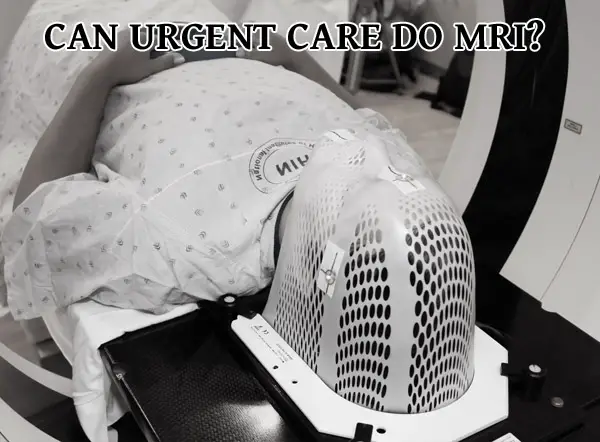Urgent care facilities play an important role in tending to the non-life-threatening cases outside of the emergency department for which the patient would have otherwise gone to the emergency department. They provide their services at a lower price than any typical emergency department, and anyone can walk in anytime to get the treatment that they need as they don’t need referrals.

However, the services they provide are limited, and so are the investigations they offer. So, can you get an MRI done in an urgent care facility?
Urgent care facilities usually don’t offer MRI scans. However, some urgent care facilities do. A typical urgent care facility offers basic investigations like X-ray, ECG, USG, blood work, etc. The services they offer may vary. Calling in beforehand will help you find out what services you can get.
MRI or magnetic resonance imaging is a radiological imaging method that utilizes super magnets to produce radiological images of the area under study. It’s a very sophisticated and safe imaging modality, as it doesn’t utilize radiation to scan the body, unlike CT scan. Even though MRI scans play an important role in making a clinical diagnosis in modern medicine, their availability is often limited, and so is their application, especially in emergency situations. You will most likely find them in larger hospitals or health care facilities, but they are usually not available in urgent care facilities.
What is an urgent care facility? When is MRI needed on an urgent basis? We’ll explore these questions and more in this article.
What Do Urgent Care Facilities Do?
Urgent care facilities provide basic medical facilities, like investigations and treatment, for non-emergency conditions. They also provide other medical services like vaccinations, immunizations, and certain screening tests.
Urgent care facilities are a great place to seek help for non-life-threatening conditions, as they don’t need a referral to see a patient and are cheaper when compared to any emergency department. The waiting time in urgent care facilities is also usually shorter. In addition to this, they help reduce the load on the emergency services by taking on the cases that can be dealt with outside of the emergency department.
It is, however, essential that the patient understands that urgent care facilities don’t offer emergency investigations or interventions. They may even lack many superior investigations and scans, like an MRI, etc. Therefore, if there is any health emergency, you should only go to the nearest emergency department, or call 911.
What Are The Services Provided By An Urgent Care?
Some of the services that you can avail yourself at any urgent care facilities are as follows:
-
Treatment of fever and other infections like sore throat
-
Seasonal flu
-
Stitching up minor cuts
-
Minor burns
-
Minor accidents and injuries, including strain, sprain, stable fractures, and dislocations.
-
Abscesses
-
Minor acute illnesses
-
General medical examinations
-
Routine blood work, ECG, and basic radiological investigations.
-
Vaccination and immunization
-
Other routine preventative services.
-
COVID 19 testing, and other routine screening tests like for STDs
-
Drug and alcohol testing.
The services provided by the urgent care center may vary from place to place, so calling in beforehand would be a good idea to find out if they offer the services you are seeking. For any severe acute illnesses or major injuries, active bleeding, etc please visit your local emergency department.
When Is MRI Used?
An MRI is a non-invasive procedure usually done to see soft tissue and related conditions better.
They are most commonly used for imaging the brain to see brain pathologies, like tumors, aneurysms, stroke, diffuse axonal injury, multiple sclerosis, etc.
Some eye and ear pathologies may also require an MRI to help make a diagnosis.
Additionally, certain chronic issues may also require an MRI scan to help make a diagnosis. Conditions like chronic headache and chronic backache are two such conditions where your doctor may ask for an MRI.
Other structures like blood vessels ligaments and tendons, etc—the structures that are not seen on X-ray or CT scan— can also be seen in MRI. So, conditions like aneurysms of the aorta, to see the extent of heart attack and other heart diseases, blockages in blood vessels, ligament and tendon tear, bone infections, bone tumors, soft tissue tumors, etc, can also be better seen in an MRI.
MRI can also be used to perform other guided procedures like MRI guided radiotherapy and MRI guided biopsy
For blood vessels and related conditions, MRI can be performed after injecting a dye into the system that highlights the blood vessels in the scan. This procedure is called an MRA (magnetic resonance angiography), and unlike traditional angiograms, it does not require catheter insertion to see the blood vessels and is, therefore, less invasive.
Why Would an MRI be Urgent?
MRI is usually not performed in emergency conditions. This is because they require a long time to scan the body. An MRI scan can take anywhere between 20 to 90 minutes to scan the body— depending on how extensive of a scan is required. In life-threatening conditions, like stroke, head injury, acute bleed, etc, 20 to 90 minutes can cost the patient’s life.
Therefore, in such emergency situations, CT scans, USG, and X-rays are preferred to save time, as they give the results pretty quickly. These investigations give good enough results to initiate emergency treatment.
Although, once the patient is stabilized and is out of danger, your doctor may ask for an MRI to see the pathology or the extent of the injury or disease better. This helps the doctor to make the treatment even more specific for the diagnosis or to modify the treatment plan.
That said, there are certain conditions where MRI is needed on an urgent basis. Some of these conditions are as follows:
-
Spinal cord compression: Any condition that can result in the compression of the spinal cord will require an MRI on an urgent basis. This is because spinal cord compression can leave a patient with a permanent disability, like the inability to walk for life, etc. Spinal cord compression could result from a variety of different things, like tumors, metastasis, hematoma, infections, scoliosis, and other spinal abnormalities. The treatment for each of them would differ, and MRI would help to differentiate.
-
Various venous sinus thrombosis, like dural venous sinus thrombosis and cavernous sinus thrombosis, may also require an MRI as these result in the blockage of major venous supply of the brain, thus compromising brain circulation resulting in hypoxic brain injury.
-
Diffuse axonal injury
-
Suspected arterial dissections may also require an MRI
-
Meningoencephalitis
-
Spinal cord injuries
-
Acute cauda equina syndrome.
These are some of the conditions that may call for an MRI on an urgent basis.
What To Keep In Mind If You Are Getting An MRI?
Everyone may not be a good candidate for an MRI. Since MRI involves large magnets, people with certain types of implants and devices placed in their bodies may not be eligible for an MRI. Although, in recent times the implants are produced keeping this factor in mind, and it’s possible that the implant that has been placed in the patient’s body may be MRI-safe. To know for sure, speak to your doctor and ensure the type of implant that has been placed in your body. Your doctor and the radiologist, after an assessment, will be able to tell you if you can get an MRI or not.
This is even more important if an MRI is performed on an urgent basis, when there is a rush to scan the patient.
People with cochlear implants, metallic foreign body in the eye, cardiac pacemakers, certain types of aneurysm clips, etc, cannot get an MRI.
Any metallic ornaments (even inert), clips, piercings, and other metallic things that you may have must be removed before stepping into the MRI zone.
As for pregnant women, the non-contrast MRI is completely safe for them, as an MRI doesn’t use radiation to scan the body. However, the contrast MRI, requiring gadolinium or gadolinium-based dyes is not good for the fetus and can lead to many complications including stillbirth and early neonatal deaths. Therefore, your doctor may ask for an alternate investigation.
Claustrophobics may need sedation before an MRI.
Some people may also be allergic to dyes. The severity of this hypersensitivity may vary from patient to patient.
Discussing with your doctor about your overall health condition and medical history will help the doctor make a judgement on whether or not you can get an MRI.
Below is a video on what to expect during an MRI scan:
What Must You Remember About The Urgent Care Facilities
Urgent care facilities are an amazing addition to the health care system that help provide good services to the patients at affordable prices, on an urgent basis. However, there are certain limitations to them. They do not offer treatment for life-threatening conditions requiring immediate intervention. They may also lack many advanced imaging modalities and tests that may be required for the diagnosis of many illnesses.
It’s always best to call the urgent care facility to find out whether or not they offer the services that you wish to get. Their website may also have information regarding the services that they provide.
In case of major accidents, fractures, active blood loss, and other acute emergencies, please contact your local emergency department or call 911.
To know more about MRI and the kinds of structures you can see in them, read this article: Can MRI Show Detail?
